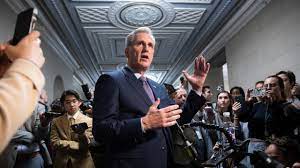W. James Antle III
From the “ungovernable” to the “chaos caucus,” the eight House Republicans who toppled Republican Rep. Kevin McCarthy as speaker get called a lot of names. But they do have some valid points that McCarthy’s eventual replacement will need to take into consideration in order to have a longer-lasting speakership: getting better control over federal spending and returning to regular order for considering these bills. One is a matter of process, the other a matter of substance.
The federal spending process is indeed in shambles. Congress has passed its required appropriations bills on time only four times in nearly five decades, with the most recent happening in 1996. Not a single appropriations bill has become law on time since 2009. In place of the appropriations measures, Congress instead passes massive omnibus spending packages or temporary spending bills known as continuing resolutions.
Conservatives wanted to see some changes when Republicans took over the House earlier this year. While dragging out McCarthy’s speaker election to 15 ballots, approximately 20 House Republicans were insisting that appropriations bills be voted on individually, that members be given adequate time to read them and that rank-and-file members of the House have the opportunity to offer amendments. Many of these Republicans did not feel the 45-day continuing resolution just passed by Congress kept these promises, and a subset of them were willing to oust McCarthy over it.
The country badly needs to get its fiscal house in order before there is an economic reckoning. The chaotic nature of the federal budget process isn’t the only reason the national debt now exceeds $33 trillion. There has been a balanced federal budget only a handful of times since 1969, most recently in 2001. Republicans have campaigned for decades on the idea that the country’s current fiscal trajectory is unsustainable, most recently making the argument that elevated federal spending levels had proved inflationary. Where the eight Republicans who seized McCarthy’s gavel get into trouble is that it is impossible to alter that fiscal trajectory while controlling by the narrowest of margins one half of the legislative branch. They simply don’t have the votes to pass the kind of sweeping spending cuts they would like, and their attempts to govern as a minority within a small majority make it difficult to govern at all.
Making progress toward these goals without shutting down the government will be one of the biggest challenges the next speaker faces. McCarthy found he had too many needles to thread to please everyone, and was ultimately beset on all sides. The two declared candidates for speaker, House Majority Leader Steve Scalise and House Judiciary Committee Chairman Jim Jordan, have some advantages in this area McCarthy lacked. Rep. Kevin Hern, chairman of the Republican Study Committee, is another name that has been floated if they cannot break the impasse.
All three are seen as more conservative than McCarthy, though Scalise had already migrated from the conservative faction to leadership long before the current dust-up. Hern leads the House GOP’s largest caucus of conservative lawmakers, while Jordan was a co-founder of the Freedom Caucus, its most exacting one. Jordan may have one asset that eluded McCarthy: the benefit of the doubt from conservatives. He would be the first Freedom Caucus speaker. At least some of his supporters appear willing to entertain getting rid of the rule that allows a single member to force a vote on vacating the speaker’s chair. And perhaps most critically, Jordan has former President Donald Trump’s endorsement.
While Jordan supported retaining McCarthy as speaker, he would not be approaching the eight GOP rebels as an outsider. Unlike most recent Republican speakers, he rose up through the ranks as a thorn in the side of leadership. The experiment of treating the conservative faction as a problem to be managed, or an insurrection to be suppressed, has clearly failed. There is no guarantee that a speaker from that faction will be successful.
Perhaps it will be a whack-a-mole problem that shifts to the GOP moderates in swing districts who will then feel the need to assert their independence from leadership, as Rep. Matt Gaetz and company are doing now. With a majority this small and this fractious, any speaker could fail. But someone may have the credibility to make compromises (and the knowledge of which compromises to avoid) that past speakers dating back to John Boehner have lacked. One obstacle may be that Jordan is closely associated with the investigations into President Joe Biden. Even some conservatives revealed they were not enamored of impeachment and may even view it as a distraction from other unrealized conservative goals.
McCarthy also sounds like he has not completely ruled out a return to the speakership at some point, though he is telling allies to stand down in the upcoming vote rather than renominate him. His farewell remarks last week suggested he had not exhausted his political ambitions, though at that time there was no obvious outlet for them. The war in Israel has perhaps created a new opening for him to reenter the fray. If his would-be successors, both of whom supported McCarthy against the motion to vacate, deadlock without any resolution in sight, it cannot be ruled out. Stranger things have happened. But it would appear to be a missed opportunity to address the underlying problems that led to his removal in the first place.
The main question would be: What has changed in the last week to make McCarthy 2.0 more viable than the original version? It would be highly ironic if in this “America First” era of the GOP, the answer was a foreign war. Bob Dole quipped upon becoming Senate majority leader that he was really the “majority pleader.” The next speaker is going to have to be willing to listen to those who rebuked McCarthy.
CNN







